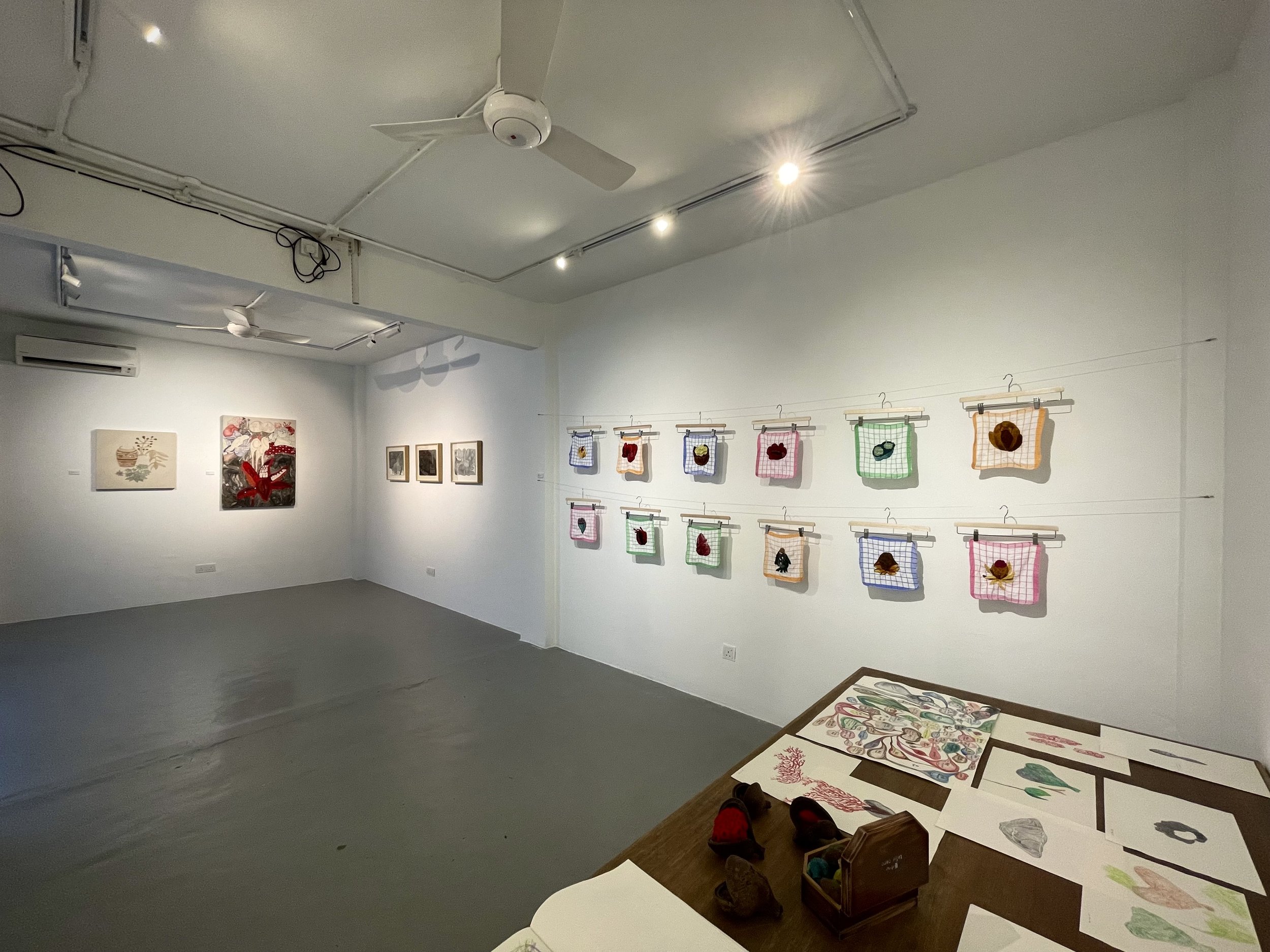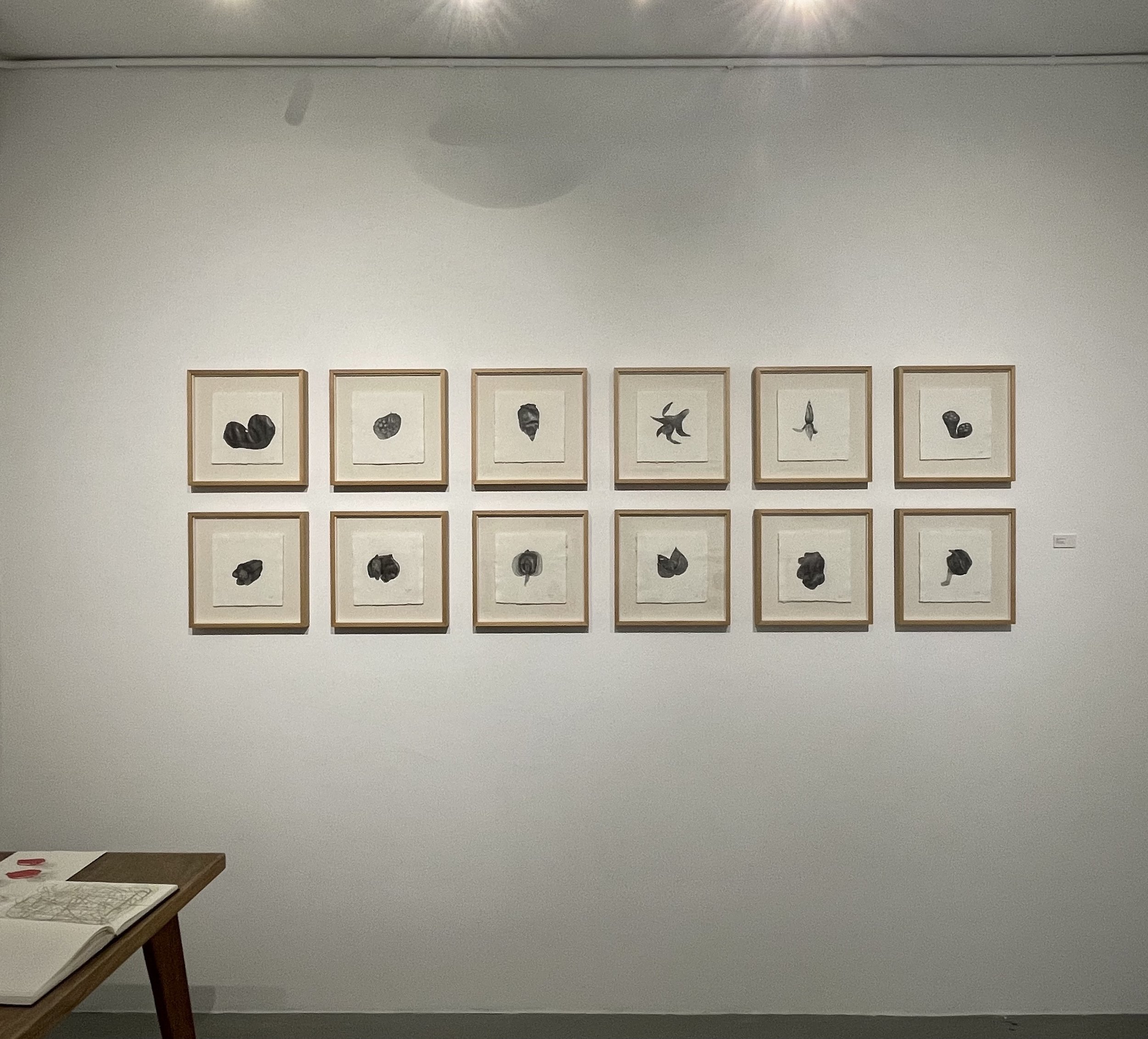Garden of the Mind is a multimedia presentation of paintings, textile works, and drawings created by the artist during her 4-month residency at Rimbun Dahan in mid-2021. In her signature style, she blends embroidery with painting and drawing to create a layered depiction of her experiences within Rimbun Dahan’s lush environment.
The works that she has brought back to the city retain the tactility of a life spent amidst nature. The dense embroidery on everyday handkerchiefs brings to mind, upon touch, the barks of trees or the ridges and valleys of a nut shell. Through the repetitive weaving of her thread through fibre, she turns the common handkerchief into one of her personal effects, embedded with her emotions and daydreams. The subject of her Rimbun Dahan works is dreamt-up combinations of observational nature drawings and her own whimsy. It seems that she has successfully asserted her own mastery over the wilderness around her, but not without suffering some of the doubts and insecurities that such a close encounter with nature provokes.
Man’s relationship with nature is a theme as old as art itself, but it has become increasingly uncommon with the rise of large metropolitan cities where art centres are clustered. For many of Malaysia’s young contemporary artists, Rimbun Dahan is likely their first and only encounter with nature in such a varied and majestic state, and it is no surprise that many artists who embark on the residency often emerge with artworks centred on these surroundings. Likewise for Yi Lin, nature has a special place in her recent works.
An avid hiker, nature opens up the world to Yi Lin. In nature, she encounters various new ways of being that thrive unseen by civilisation. She described her time in Rimbun Dahan—alone, in the middle of a pandemic and lockdown—as like “playing hide and seek with [her]self.” For the artist, whose past work is concerned with memory and the gaps in being, the quiet and unfamiliar natural world perhaps offers her a way to be reconciled to herself. Yi Lin “seeks” out her own self by drawing on forms and metaphors from nature and subtly combining them with her own impressions to produce new forms and landscapes that are laden with affect. Mystery encloses her works, where pencil and charcoal are layered thickly and negative space seems to be an active presence. The mind maps she is fond of creating give an insight into her thought processes; interestingly, she connects nature with emptiness and death, perhaps a reflection of the insecurity that nature can provoke.
Garden of the Mind shows an artist’s struggle with herself and her profession but also, on a more cosmic level, with Mother Nature in all Her chaos and glory. It invites thought as to what humans can gain out of a relationship to the natural world, how it can inspire our creative productivity and perhaps even answer some of our questions about our place in the universe.
About the Artist
Chong Yi Lin received her Diploma in Fine Arts from the Dasein Academy of Arts in 2013, before receiving her Bachelor of Fine Arts from Taipei National University of Arts, Taiwan, in 2019.
Her works explore the politics of sentiment through a fusion of nostalgia, symbolism, and daily personal rituals in an attempt to capture the complexities of life, love, and loss. She approaches sentiment through a kind of reconciliation via objects; for her, objects have a certain permanence and stability that she finds comforting. Her works tend to feature drawing and textiles, in particular embroidery with thread, which she favours for its malleability and softness. Through the back and forth of her needlework, she embeds her emotions into her objects.
In 2015, she had her first solo exhibition, titled Ashes of Time, at Lostgens’ Contemporary Art Space in Kuala Lumpur. Since then, she has exhibited in various art spaces across Kuala Lumpur and Taipei. In 2021, she was selected to undertake a three-month residency at Rimbun Dahan. Garden of the Mind presents a selection of works made during her time at Rimbun Dahan, and is her second solo exhibition.


